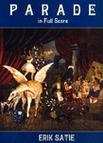Parade in Full Score (平装)
2000-9
Dover Publications (2000年11月1日)
Erik Satie
114
Although his name was associated with fashionable artistic movements of early 20th-century Paris-Cubism, Surrealism, Dadaism, and Neoclassicism-Erik Satie followed his own light, never belonging to any group or adopting a particular doctrine. A true nonconformist, he struck out on his own path to develop a musical structure reflecting his unique personality and eccentricities,anticipating artistic tendencies that others shaped into dogma. Satie's 1916 ballet Parade, created in collaboration with three leading artists of the period, was hailed as a "Cubist manifesto." Jean Cocteau created the idea for the production; Pablo Picasso designed sets and costumes; and Leonide Massine choreographed the production and danced in the premiere perfor-mance of May 18, 1917. Stripped of subjective emotion, the work removes basic fragments of melody and simple harmonies from their conventional associa-tions, recasting them in unexpected but logical patterns-a practice similar to the Cubist painters' transformation of everyday items into novel configura-tions. This inexpensive full score will be treasured by music lovers and all admirers of this uniquely influential 20th-century composer. Unabridged Dover (2000) republication of Erik Satie, Parade." Ballet rdaliste sur un theme de Jean Cocteau, originally published by Editions Salabert, Paris, 1917. Credits. Glossary. Note. Introduction by Victor Rangel-Ribeiro. 128pp. 9 x 12.Paperbound.
IntroductionInstrumentationGlossaryCreditsNote by Georges AuricParade: Ballet realiste sur un theme de Jean CocteauParade: Realist ballet on a theme of Jean Cocteau (1916-17)ChoralPre1ude du rideau rouge·Prelude of the red curtainⅠ.Prestidigitateur chinois·Chinese conjurerⅡ.Petite fille am6ricaine·Young American girlⅢ.Acrobates·AcrobatsFinalSuite au Pre1ude du rideau rouge·Continuation of the Prelude of the red curtain

Parade in Full Score (平装) PDF格式下载